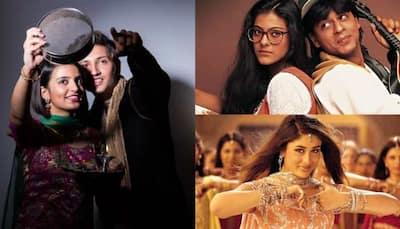
Karwa Chauth, a revered festival deeply embedded in Indian tradition, holds a significant place in the cultural tapestry of India. Annually celebrated with immense zeal by married women who fast for the long life and welfare of their husbands, the festival is a testament to love, devotion, and the sanctity of marriage. Bollywood, known far and wide for its vibrant depiction of Indian culture, has masterfully captured Karwa Chauth’s true essence through its cinematic lens, bringing both the festival and its intrinsic emotions to life on screen. With a keen focus on rituals, emotions, love, and dedication, several Bollywood films have authentically portrayed the quintessence of Karwa Chauth, echoing the profound sentiments connected to this age-old custom.
1. Dilwale Dulhania Le Jayenge (1995)
Among the pantheon of Bollywood classics, “Dilwale Dulhania Le Jayenge” stands as a monumental film that artfully portrays the Karwa Chauth ritual. The unforgettable scene where Simran, played by Kajol, observes a fast for Raj, portrayed by Shah Rukh Khan, resonates deeply with audiences. The moonrise scene, a melange of love and heartfelt emotion, has solidified its status as one of Bollywood’s most iconic depictions of the festival. The movie doesn’t just highlight the observance of the custom but delves into the emotional bond shared by the couple, thereby establishing itself as a cultural beacon for Karwa Chauth celebrations.
2. Baghban (2003)
“Baghban” is a poignant film that eloquently narrates love, sacrifice, and familial values. The Karwa Chauth scene featuring Amitabh Bachchan and Hema Malini adds a layer of profound depth to their relationship, illustrating their unwavering love even after many years of marriage. The scene strikes an emotional chord, accentuating the festival’s essence, where the couple’s dedication and devotion to each other remain steadfast, emphasizing their lifelong commitment and mutual respect.
3. Kabhi Khushi Kabhie Gham (2001)
In “Kabhi Khushi Kabhie Gham,” the vibrant Karwa Chauth sequence between the characters Rahul (Shah Rukh Khan) and Anjali (Kajol) is especially memorable for its portrayal of the festival. Dressed in traditional attire, the scene captures the joy, devotion, and ceremonial elements vibrant in the festival. Through this emotionally rich depiction, the film intricately weaves Karwa Chauth into the broader thematic tapestry of familial bonds and the celebration of love inherent in Indian culture.
4.
. Ishq Vishk (2003)
“Ishq Vishk” brings a touch of youthful romance to the festival through its depiction of Karwa Chauth. In the film, the character Payal, portrayed by Amrita Rao, fasts for Rajiv, played by Shahid Kapoor, symbolizing her heartfelt feelings and hopeful dreams for their future. The film’s portrayal of the festival is both light-hearted and emotionally significant, reflecting how young couples embrace age-old traditions like Karwa Chauth while navigating modern relationships.
5. Hum Dil De Chuke Sanam (1999)
“Hum Dil De Chuke Sanam” presents Karwa Chauth within a dramatic and emotionally intense storyline. The character Nandini, played by Aishwarya Rai, conducts the fast for Vanraj, portrayed by Ajay Devgn, despite her love for another man. The film intricately intertwines the festival into its narrative, exploring themes of emotional conflict, commitment, and self-sacrifice in relationships. The Karwa Chauth scene symbolizes Nandini’s respect for her husband and the sacred bond of marriage.
6. Biwi No. 1 (1999)
With a comedic twist, “Biwi No. 1” offers a humorous take on Karwa Chauth celebrations. Karishma Kapoor’s character Pooja fasts for her husband Prem, played by Salman Khan, unknowing of his extramarital affairs. The film deftly combines comedy with the rituals of the festival, shining a light on the ups and downs of married life. Despite its humorous tone, the scenes underscore the festival’s traditional values and cultural importance, making it a notable depiction within Bollywood cinema.
Bollywood’s portrayal of Karwa Chauth has repeatedly resonated with audiences by underscoring the festival’s emotional depth and cultural significance. Through narratives of love, devotion, and sacrifice, these films celebrate the rich tapestry of Indian traditions, demonstrating how Karwa Chauth, whether depicted with grandeur or light-heartedness, remains a potent symbol of love and unity in Indian cinema.












